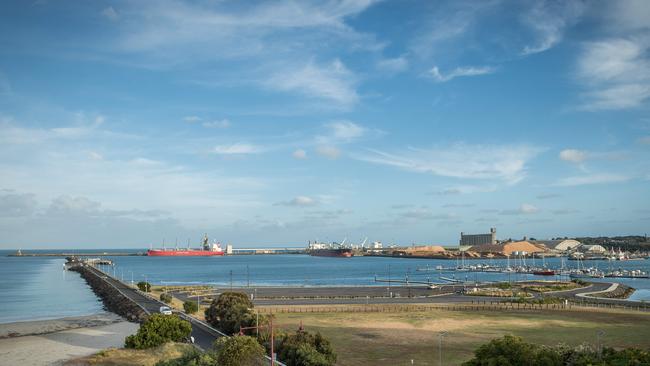Grid stability key to keeping smelter open: Alcoa
Alcoa CEO Roy Harvey has warned that the stability of the Victorian grid will be a key factor in keeping the Portland smelter open.

Alcoa CEO Roy Harvey has warned that the stability of the Victorian grid will be a key factor in keeping the Portland smelter open, telling analysts a key point in negotiations over a new power deal is whether Portland will be compensated if it is forced to shut down during power outages.
Speaking after Alcoa delivered its December-quarter results, Mr Harvey said hope was still alive that Portland would continue to operate after its power deal ran out in the middle of the year, saying the company was edging towards a new deal.
But he said the stability of the national energy market remained a key factor in Alcoa’s thinking.
“To find a long-term workable solution, there are two key requirements — an internationally competitive power price, including generation and transmission fees, and flexibility to manage the continued risks of grid instability,” he said.
“We are encouraged by positive engagement with stakeholders in Australia including the federal and Victorian governments and energy generators.”
Alcoa’s negotiating position is believed to mirror that of Rio Tinto’s recent successful attempts to get a new power deal for its Tiwai Point smelter, negotiating New Zealand generator Meridian Energy down on price while pushing the NZ government to ease the charges levied on the poles and wires carrying power to the plant.
Alcoa is still locked in negotiations with Victoria, but rather than seeking an increase in direct subsidies as part of a new package, the company is believed to be asking the state for a waiver on an easement tax levied through state-owned transmission company AusNet on power lines that carry energy to the plant — ironically, a levy originally raised on all Victoria power users to cover the costs of the original Portland operating subsidies.
In parallel, it is still negotiating with power companies to knock down prices, given Portland consumes 10 per cent of Victoria’s power and plays a key role in stabilising the grid.
Mr Harvey told analysts Alcoa was also seeking a guarantee that it would not see a repeat of the power outage in late 2016 that shut off supply to the plant for more than five hours, crippling the smelter for months after molten aluminium cooled in the pots, forcing a major refit.
The smelter suffered a second near-death experience in late 2019, amid a second heatwave, but workers at the plant narrowly prevented aluminium from cooling from a second prolonged power outage.
“You only can spend a couple of hours, three hours [out] before our plant gets into serious trouble,” Mr Harvey told analysts.
“So, the flexibility we need, number one is to make sure that we have a consistent power supply. And then, number two, that our contracts are sufficiently flexible and give us extra clauses. That means we are not forced to rebuild in order to restart and that we have the right path forward so that we cannot only have a good price, but also have the flexibility in case something were to go wrong because of the instability of that particular grid.”
Last month, the federal government offered a $76.8m package to help guarantee the massive energy user continues to play its role in stabilising the east coast energy grid.
Under the deal, Alcoa would be required to dial down its Portland smelter if the Victorian power grid comes under pressure in the summer heat, a role it has often played when coal-fired power stations become erratic as temperatures soar.
In exchange, it would be paid for the load shedding, with the federal government agreeing to guarantee $76.8m worth of payments from the Australian Energy Market Operator’s so-called Reliability and Emergency Reserve Trade scheme over the next four years. Portland already has access to the scheme, but is not always paid when ordered to temporarily slow its operations by AEMO.
But Mr Harvey suggested Alcoa was also seeking to be paid if its power supply was interrupted through no fault of its own, as well as receiving payments if AEMO ordered a temporary curtailment to stabilise the grid.
“What are the clauses in case there is another power disruption, whether it’s a take-or-pay or whether you structure it in some other way? How do you recognise the instability of the grid?” he said.
Portland has been under threat of closure for more than a year, after majority owner Alcoa flagged a review of its future if a new, cheaper energy contract could not be negotiated ahead of the expiry of the current deal — and a four-year subsidy agreement with the Victorian government — in mid-2021.
Mr Harvey told analysts he was happy the company was “making progress” in the negotiations with the state and federal government, and power providers, but indicated it may still be some time before an outcome was reached.
Portland’s current power contract is with AGL Energy, and a spokeswoman for the company said AGL was “continuing to work with Alcoa in order to provide sufficient supply to the smelter and enable its continued operations”.
Portland’s future has also been bolstered by steady improvement in the price of aluminium since the price hit rock bottom as the coronavirus pandemic hit manufacturing centres across the globe.
Aluminium was trading just above $US1400 a tonne in April, but is now sitting just over $US2000 a tonne.
However, those prices may not hold, with Fitch analysts warning on Tuesday they expected Chinese smelters to lift production to meet returning demand, and they expected the aluminium price to average about $US1850 a tonne this year.
Average electricity spot prices have halved from a year ago to between $40 and $45 a megawatt hour in most states.

To join the conversation, please log in. Don't have an account? Register
Join the conversation, you are commenting as Logout